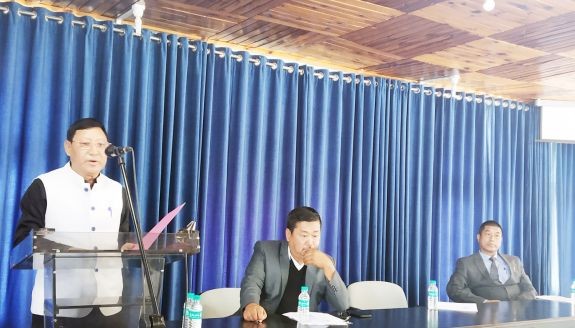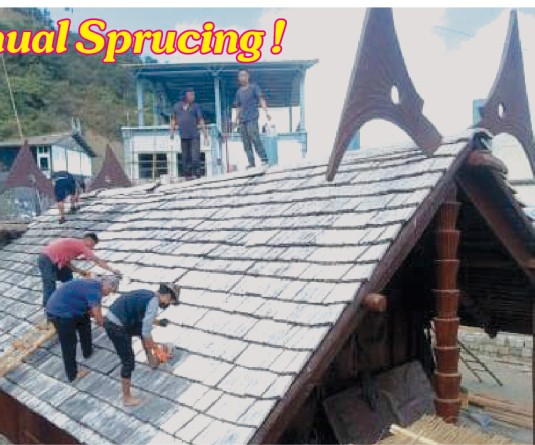Advisor WRD Namri Nchang speaking during the programme on March 22. (Morung Photo)

March 22 is World Water Day
Morung Express News
Kohima | March 22
The launching of the Jal Shakti Abhiyan-II under the theme ‘Catch the rain where it falls, when it falls’ could not have come at an appropriate time with shortage of water in Nagaland’s capital Kohima and numerous villages.
Launching the campaign in commemoration of World Water Day on March 22 at the conference hall of the Chief Engineer’s office, Water Resources Department in Kohima, Advisor for the Water Resources Department, Namri Nchang laid emphasis on the relevance of the mission.
With climate change disrupting the water cycle and precipitation, Nchang observed that water sources like, rivers, lakes, ground water basin are degrading both in quantity and quality, making it unsuitable for both aquatic fauna and human consumption.
Expressing concern on some common contributing factors to depletion of water retention capacity in Nagaland, Nchang viewed that deforestation, jhum cultivation and other biotic interventions have affected water retention capacity. These have also depleted the quality of monsoon fed sources such as streams, rivulets, springs and ponds.
“Today, water crisis has become a reality, a scarce commodity almost everywhere in state,” said the Advisor, lamenting that water, which is a natural and renewal resource is ‘not free anymore’ and bottled water, which comes at a dear price, has become a necessity.
Nchang attributed poor water resource management, poor distribution system of domestic water, rampant deforestation and poor storage facilities as factors compounding the problem of water shortage.
Toward this end, he said there is a growing need to improve the use of water by encouraging judicious use of water, reducing water waste and to fully utilise and store rain water in all probable storage sites through sensitisation and awareness programmes involving local authorities.
He also suggested that to meet various purposes, run-off water from the catchment areas into rivers and streams can be blocked and diverted to water harvesting structures, construction of rain water harvesting structures to tap rain water from rooftops, construction of farm ponds for storage of monsoon run-offs and recharging of ground water should be adopted.
Harness the available water resources and its proper management is top priority, he explained, adding that water conservation is not to stop or prevent the use of water but to maximise its use efficiency.
In this regard, he called upon all stakeholder departments to act for planned programmes and activities to ensure that water resources are utilised in a sustainable manner while ensuring that water is equitably shared and wastage is minimized by all users.
“Saving water doesn't only help in conserving water, but it is a weapon to tackle the negative impact of climate change,” said Nchang.
Meanwhile, giving an overview of the campaign, Chief Engineer, Hotovi Ayemi said the Jal Shakti Abhiyan was launched in 2019 with a target of covering 1,592 blocks out of 2,836 blocks of 256 water stressed districts in India. Encouraged with the success of the campaign, he maintained that the Ministry of Jal Shakti launched the second phase from March 22 to November 20, 2021.
Spearheading the campaign, the Nehru Yuva Kendra Sangthan (NYKS) will be conducting educational and motivational programmes, mass awareness campaigns, environment building etc.
Besides, it will also enumerate water bodies, cross checking the same with revenue records, identify and classify all encroachments, remove temporary encroachments, ensure rooftop rain water harvesting structures in all government buildings, conduct tree plantations, rejuvenate water sources and conduct GIS mapping of all existing water bodies.
Ayemi said the main focus of the campaign is to seek the support of all stakeholders to adopt proper rainwater harvesting measures with people’s active participation and to spread awareness among the citizens about the need of water conservation.
The occasion was also celebrated across Nagaland on Saturday with the purpose of highlighting the importance of water and raising awareness about the water crisis that the world faces.
Kohima: The Public Health Engineering Department (PHED) observed World Water Day at the Deputy Commissioner’s Conference Hall, Kohima on Saturday. Executive Engineer, PHED (R) Kohima Division Er Supongyanger delivered the keynote address and underscored that the value of water is about much more than its price, and includes the environmental and socio-cultural value placed on water resources.
According to a DIPR report, he also urged the citizens to practice ways to conserve water in their daily routines by following some important and easy ways to conserve water such as, keeping the tap closed when not in use, practicing rainwater harvesting, protecting water resources, etc.
Kohima DC Gregory Thejawelie also spoke on the occasion and highlighted how water is connected to every form of life on earth and is a basic human need. He urged the PHED to create awareness on rain water harvesting particularly for a place like Kohima, where water crisis occurs frequently.
Chemist, DWSM, PHED Kohima Division, Dziesetseinuo Kiso emphasised on the importance of safe drinking water and highlighted the risks of consuming unsafe water, the DIPR report stated.
Wokha: District Coordinator DWSM Aremo Ovung delivered the keynote address during the programme organised by the Wokha PHED. Ovung dwelt on the need to create awareness on the global water crisis and the urgent need for conserving water which is vital for sustaining life. He also sensitized the gathering about the ‘Jal Shakti Abhiyan: Catch the Rain Campaign’ which was launched by Prime Minister Narendra Modi on March 22, informed a DIPR report.
The campaign, launched under the theme ‘Where it falls, when it falls,’ aims to encourage the public to construct rain water harvesting structures, the report stated.
IEC consultant Khonzani Kithan elaborated on the judicious use of water, importance of water and its health benefits.
She also urged the gathering to focus on the current water crisis and to cooperate in order to overcome the crisis and to inculcate and follow the basic ways of harvesting and conserving water.
Phek: The ICAR-NRC on Mithun, KVK Phek, celebrated the day at KVK Training Hall, Porba, with various activities including a drawing competition on the theme ‘Valuing water’ was organised for the students of Government High School Porba and a technical session where Dr Hannah K Asangla, ACTO Agronomy gave a presentation on the importance of water in agriculture.
According to updates from KVK Phek, Dr Debojyoti Borkotoky, ACTO Animal Science, delivered a lecture on water management in livestock production. In order to use water efficiently, a lecture on micro irrigation in agriculture was delivered by Dr Rinku Bharali, CTO Horticulture.
Speaking on the occasion, Vedupra, JSCO, Department of Soil & Water Conservation, Zuketsa, emphasised on the practical aspects of water conservation. He also highlighted on the importance of rainwater harvesting and to practice tree plantation. Dzuthozo, Teacher I/c of GHS Porba spoke on the importance of water and how to save water for the future generation while Kishan Gosthi was also organised for the SHG women farmers, the updates stated. The programme concluded with prize distribution ceremony and words of appreciation delivered by Keniseto Chucha, Farm manager, KVK Phek.
Medziphema: The programme at ICAR Research Complex for NEH Region, Nagaland Centre, Medziphema, was graced by Nagaland Advisor for Sericulture, Excise and Minority Affairs Zhaleo Rio as special guest. In his speech, Rio enlightened the gathering about the multiple uses of water based on its utility and location and shared about the Jal Shakti Abhiyan campaign. He also stressed on the use of clean water for drinking purposes and encouraged the villagers to take advantage of the good and clean water available in their reach instead of being dependent on bottled water.
According to a press release from ICAR, Pro-Vice Chancellor, NU, SASRD, Medziphema Prof M Aleminla Ao talked about the importance of World Water Day and how crucial it is to value water. Water is also very importance on environment, agriculture, trade and commerce and we cannot run our household without water, she stated.
Among others, Dr AK Sangwan, Dean, College of Veterinary Sciences and Animal Husbandry, CAU, Jalukie, Dr SV Ngachan, Ex-Director, ICAR Res. Complex for NEH Region, Meghalaya, Dr DJ Rajkhowa, Joint Director, ICAR Nagaland Centre, and Dr LK Baishya, Principal Scientist (Agronomy) also spoke during the programme, the release stated. Inputs were distributed to the participating farmers after which technical session and farmer-scientist interactions were conducted, it added.
Molvom: At Molvom village in Dimapur district, SDO (PHED) Medziphema Er Ichirang Zeliang highlighted the importance of conserving and preserving water sources during a programme organised by PHED Dimapur. He also talked about the plans and programmes of the department and solicited cooperation from the community to bring constructive development in the coming years.
According to updates, Imojungla Longkumer, Co-ordinator, DWSM spoke on the topic ‘Safe drinking water’ and elaborated on the water contaminants, preventive measures, with the focus on rainwater harvesting.






